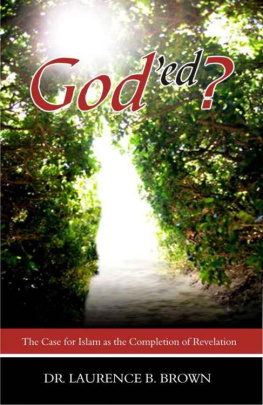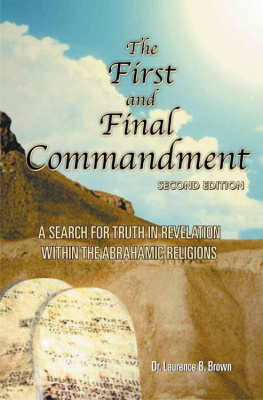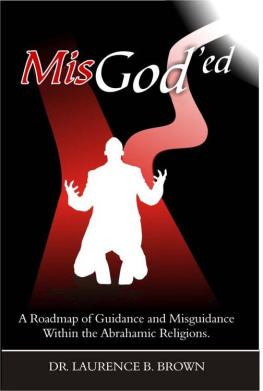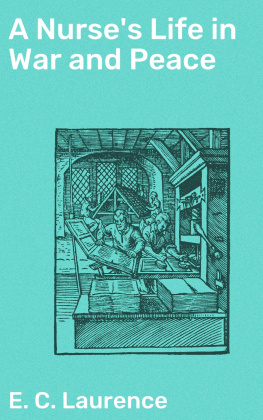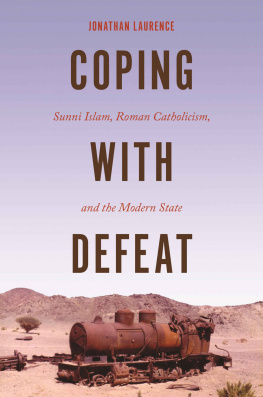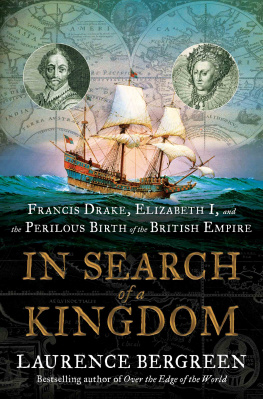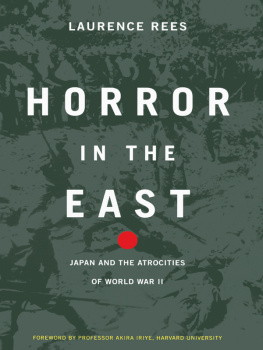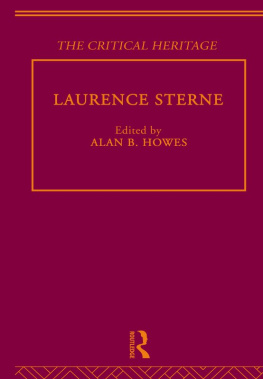Dr. Laurence B. Brown - Goded
Here you can read online Dr. Laurence B. Brown - Goded full text of the book (entire story) in english for free. Download pdf and epub, get meaning, cover and reviews about this ebook. year: 2008, publisher: Booksurge, genre: Religion. Description of the work, (preface) as well as reviews are available. Best literature library LitArk.com created for fans of good reading and offers a wide selection of genres:
Romance novel
Science fiction
Adventure
Detective
Science
History
Home and family
Prose
Art
Politics
Computer
Non-fiction
Religion
Business
Children
Humor
Choose a favorite category and find really read worthwhile books. Enjoy immersion in the world of imagination, feel the emotions of the characters or learn something new for yourself, make an fascinating discovery.
- Book:Goded
- Author:
- Publisher:Booksurge
- Genre:
- Year:2008
- Rating:5 / 5
- Favourites:Add to favourites
- Your mark:
- 100
- 1
- 2
- 3
- 4
- 5
Goded: summary, description and annotation
We offer to read an annotation, description, summary or preface (depends on what the author of the book "Goded" wrote himself). If you haven't found the necessary information about the book — write in the comments, we will try to find it.
Goded — read online for free the complete book (whole text) full work
Below is the text of the book, divided by pages. System saving the place of the last page read, allows you to conveniently read the book "Goded" online for free, without having to search again every time where you left off. Put a bookmark, and you can go to the page where you finished reading at any time.
Font size:
Interval:
Bookmark:

All rights reserved.
ISBN: 1-4196-8460-4
ISBN-13: 978-1419684609
Lines lead from the very first Jewish Christianity to the seventh century, indeed to Islam.... The analogies between the Quranic picture of Jesus and a Christology with a Jewish-Christian stamp are perplexing. These parallels are irrefutable and call for more intensive historical and systematic reflection.
Hans Kng, Islam, Past, Present and Future
(2007, One World Publications. pp. 37, 44)
Biblical quotes in the following work, unless otherwise noted, are taken from the New King James Version. The reason for selecting this version of the Bible does not relate to the degree of scriptural fidelity, which is debatable, but rather to the popularity of the text. In English-speaking countries, the 1611 edition of the King James Version is the most widely read translation of the Bible. The New King James Version (NKJV) grew from an effort to render the 1611 translation more accessible to modern readers, tossing the thees and thous out the window. Unfortunately, little effort has been made to reconcile differences between the 1611 King James Version and the Sinaiticus and Vaticanus codices, which were discovered two centuries afterward and contain the oldest and most authoritative New Testament manuscripts found to date. Now that they are available, one can reasonably expect to see their influence upon more modern translations, but this is not the case in the New King James Version, which retains verses and passages in conflict with the most ancient and respected New Testament manuscripts. Therefore, while this book predominantly cites the New King James Version in the interest of satisfying the Protestant majority of Western Christianity, a complementary version is employed where greater scholastic accuracy is required.
The New Revised Standard Version (NRSV) fills this gap. Like its predecessor, the Revised Standard Version (RSV), the NRSV is an ecumenical collaboration, reflected in its three separate Protestant, Roman Catholic, and Eastern Orthodox editions. More importantly, the NRSV reflects modern biblical scholarship hitherto unavailable. Indeed, the dust had barely been blown off the Dead Sea Scrolls when the RSV translation of the Old Testament was first published in 1946. For these reasons, the NRSV has effectively replaced the Revised Standard Version and enjoys the broadest acceptance of all Bible translations.
Quotations from the World Bibliography of Translations of the Meanings of the Holy Quran (hereafter TMQ), unless otherwise noted, are taken from Abdullah Yusuf Alis The Holy Quran: Translation and Commentary. Where more exacting translation is required, those of Saheeh International or of Muhammad Al-Hilali and Muhammad Khan (i.e., The Noble Quran) are employed.
Those who question the use of multiple translations need to understand that no language, and most especially one as complex as Arabic, can be translated with complete accuracy. As Professor A. Guillaume stated, The Quran is one of the worlds classics which cannot be translated without grave loss.
Hence the need for multiple translations, for no single translation can adequately convey the meaning of the original.
Life is rather like a tin of sardineswere all of us looking for the key.
Alan Bennett, Beyond the Fringe
This is the second of two books devoted to an analysis of the three Abrahamic faiths of Judaism, Christianity, and Islam. As stated in the first book, MisGoded, the goals of this analysis are to define the valid links in the chain of revelation, trace this chain to its conclusion, and in the process expose the faithful and unfaithful (i.e., the Goded and mis-Goded) from among those who claim divine guidance. I assume readers have already finished the first book in the series, but for those who havent, MisGoded defined the differences between the Judaic, Christian, and Islamic understandings of God, analyzed the doctrinal differences that separate Christianity from Islam, and exposed the weaknesses of Judeo-Christian scripture and dogma. With regard to the latter, many of these weaknesses have become compounded, such as when false tenets of Christian faith were derived from scribal errors or scriptural forgeries. In other cases, illegitimate tenets of Christian faith were derived from non-biblical sources, which, of course, means scripture had little or nothing to do with them. Where elements of Christian canon were derived from biblical sources, it is shocking to find Pauls teachings given priority over those of Jesus Christ, especially when the two teachings openly conflict.
This unreliability of Judeo-Christian sources forces many sincere seekers to look elsewhere for guidance. Hence this second volume in the series. Many who question institutionalized Jewish or Christian dogma find their logical objections opposed by the fiery emotion that accompanies blind indoctrination.
Not so with Islam.
In the words of Margaret Nydell, They [i.e., Arab Muslims] are secure in their belief about the completeness of Islam, since it is accepted as the third and final refinement of the two previously revealed religions, Judaism and Christianity.
Many find the Islamic approach to religion refreshing, for Islam condemns blind indoctrination and demands derivation of religious truths from foundational evidence. Islam teaches accepted beliefs, to be sure, but it also claims not to overstep the boundaries of reason. Objective study is expected to reveal the chain of revelation and expose the unacceptable, ungodly elements of all scriptures and philosophies superseded by the revelation of the Holy Quran. Those who agree with this opinion recognize submission to the will of God as the only code of life acceptable to the Creator, and discover the teachings of Islam not only in the Holy Quran, but also in the scriptures that preceded it.
The Islamic claim is that sincere seekers should not feel intimidated, for Islam is nothing more than a revival and confirmation of the teachings of all the prophets. As stated in the Holy Quran, This Quran is not such as can be produced by other than Allah; on the contrary, it is a confirmation of (revelations) that went before it, and a fuller explanation of the Bookwherein there is no doubtfrom the Lord of the Worlds (TMQ 10:37). On the other hand, Jewish and Christian institutions might feel very much threatened, for Islam exposes the false foundations upon which these institutions were constructedfoundations that, more often than not, were fabricated from followers teachings in preference to those of the prophets themselves.
How did this happen? According to Islam, in the days of oral tradition, Allah (i.e., God) sent a prophet to every nation. But when Allah gifted mankind with written language, the books of scripture supplanted the need for such a plethora of prophets. Revelation reached subsequent generations through the combination of oral tradition, written scripture, and religious men and women who served as pious examples to their communities.
Next pageFont size:
Interval:
Bookmark:
Similar books «Goded»
Look at similar books to Goded. We have selected literature similar in name and meaning in the hope of providing readers with more options to find new, interesting, not yet read works.
Discussion, reviews of the book Goded and just readers' own opinions. Leave your comments, write what you think about the work, its meaning or the main characters. Specify what exactly you liked and what you didn't like, and why you think so.

